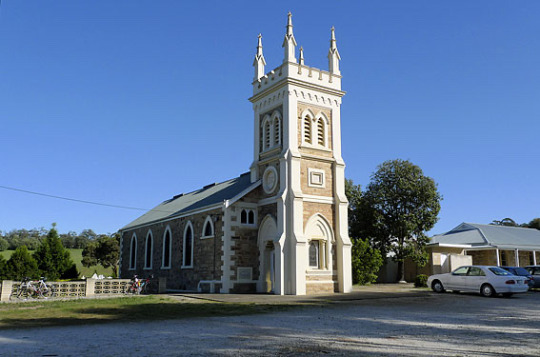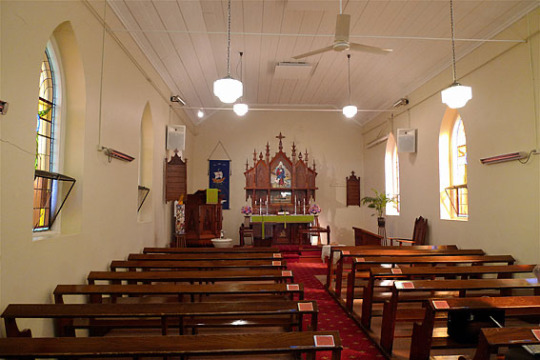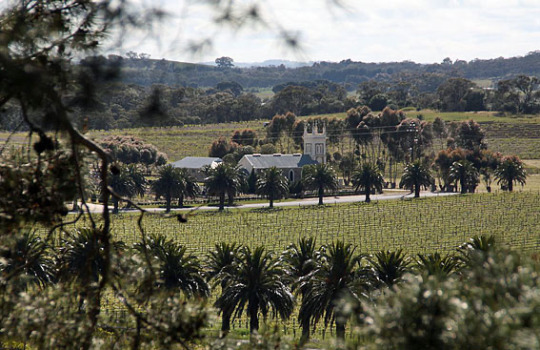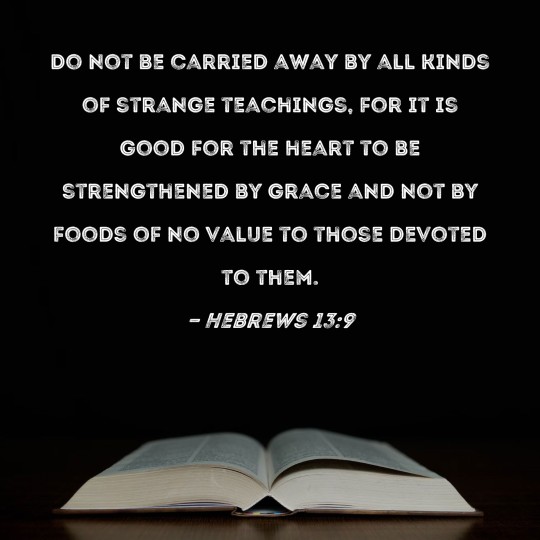#confessional lutheran
Explore tagged Tumblr posts
Note
Being Lutheran, what's your opinion on divorce in which no one cheated but abuse has taken place? I dont know if the bible allows for that but if I was getting hit or screamed at by my spouse I think I'd get out and think on heaven later
You are certainly allowed to leave if you are being abused. Get out, file a police report, get a restraining order, get a firearm (especially if you have children who also need to be protected from this person)
"Screamed at" might need more context. Occasional two-sided screaming matches between spouses vs. a consistent pattern of one-sided verbal abuse. The former might be a case for marriage counseling, while the latter would be considered abuse.
The question here is not whether you are allowed to physically leave the home, but whether you are allowed to marry someone else later. The only clear scripture on remarriage addresses infidelity (you leave your spouse because they cheated on you) and the death of the spouse - there is no specific instruction that a person who flees abuse can marry someone else.
If someone has already fled an abusive situation, found safety, and received support in processing the trauma that they went through, and then finds they want to marry someone else, I would tell them to talk to their pastor.
27 notes
·
View notes
Text
happy new year and may the Lord be with us in this gentle new year
5 notes
·
View notes
Text



St Michael’s Gnadenfrei Lutheran Church, Marananga, South Australia.
German Lutherans immigrated to Australia in the early 1800s to escape persecution in Prussia, where they were expected to conform to Calvinist doctrine and rites. Known as ‘Old Lutherans’, they came to Australia to worship God in the good old way.
The word ‘Marananga’ means ‘my hands’ in the language of the local Overland Corner tribe of Australian Aborigines.
Photos not mine.
#confessional lutheranism#evangelical lutheranism#old lutherans#german australian#australia#immigration#churches#religion in australia
1 note
·
View note
Text
New episode! Spirit of Christ 3-- Sculptor Spirit ://open.spotify.com/show/2DywsiKu0hPgaxCrV6EUgb
#lutheranism#lutheran#aalc#lcms#SculptorSpirit#DrLeopoldSanchez#holy spirit#SpiritChristology#Christification#christology#christianity#liturgical#sacramental#ConfessionalLutheran#confessional#bookofconcord#AugsburgPhoenix#AugsburgConfession
1 note
·
View note
Text
The Narrow Way - A Case for Confessional Lutheranism
“Enter through the narrow gate, for wide is the gate and broad is the way that leads to destruction, and many are those who enter through it. How narrow is the gate, and how difficult is the way that leads to life, and there are few who find it” – Matthew 7:13-14 (English Heritage Version). Jesus throws no punches here. He plainly states that the way to the kingdom is a narrow way and that many…
0 notes
Note
why do anglicans still exist like their entire church is built on the fact that some guy wanted a male heir. or do anglicans believe that this isn't rly why their church came about
Okay, I do love clowning on my Anglican friends, but there are a few angles (da dum tss) that we can look at in terms of why the Anglican Church is a distinctive tradition.
Theologically, the Anglican Church might have started off as "Catholic without the Pope," so to speak; the Anglican Church was essentially Gallican in nature, meaning that the head of the church wasn't the seniormost bishop, but the head of the state. But even if it started off simply being in schism with the Roman Church, it didn't take very long before Reformed theology started entering the Church through the efforts of Anne Bolelyn, Thomas Cromwell, and especially Edward VI. There were preceding documents, but the Thirty-Nine articles passed by Queen Elizabeth I in 1571 helped to solidify a distinctively Anglican identity.
But it's a little more than that, too, because in addition to this Protestantization of the Anglican Church, there have also been movements within to.... "Latinize" might be the wrong word, but to bring back some traditional Catholic elements. We see this, for example, in the Oxford movement of the 1830s; many of its members would end up converting to Catholicism or Eastern Orthodoxy, but those who remained behind started the Anglo-Catholic movement which still has a strong presence. (My girlfriend goes to an Anglo-Catholic parish, and our city has at least three other ones).
This kind of dual accommodation of Reformed and Catholic theological ideas has created a unique situation for the Anglican Church; Bishop J. Neil Alexander tries to articulate this by distinguishing the Anglican Church as a "pragmatic church," in contradistinction with "confessional churches" (Catholic & Lutheran, which focus on creeds and councils) and "experiential churches" (Baptist and other groups whose memberships require a born-again moment):
What, then, does it mean to be pragmatic? It means that within the generous capacity of the Episcopal [American Anglican] Church, we do not always agree on matters of biblical interpretation or theological definition. It means that we have all gotten here by way of hundreds of different and often unique experiences of God's presence in our lives. It means that those things which other churches depend to hold themselves together will never be a central feature of our common life. We find our life together driven by our willingness to stand together at the table of God's gracious hospitality. […] That, I believe, is the pragmatism at the heart of what it means to be an Episcopalian. We are a variegated tapestry of theology and experience, and we are all the richer for it. But no level of theological agreement or experiential commonality will ever be the basis on which Episcopalians will live together well. What is possible is that we will be pragmatic —we will keep our differences in perspective— and we will recognize that ultimately nothing will divide those who are willing to stand together before God's altar to sing, to pray, and to receive the gift of God's eternity.
Now, this is a very fascinating situation, because it means that the Anglican Church has a lot of diversity in religious thought and doctrinal opinion. On an official level, that means you will have bishops aligning with different theological orientations working side by side — and, in theory, the office of Archbishop of Canterbury is supposed to alternate between Anglo-Catholic and Evangelical holders. On a more personal level, I have found that the Episcopal clergy who I interact with have varying spiritualities and theologies; one priest I know has Catholic sympathies that are so strong that he was referred to as "the Papist" in seminary, while another clergymember I know doesn't think Confession is necessary and is ambivalent about her parish's practice of Eucharistic Adoration. And they work at the same church.
Liturgically, they are also distinctive. The current bedrock of Anglican prayer is the 1662 Book of Common Prayer, which is clearly inspired by Benedictine spirituality, but with continuing liturgical revision and innovation that kind of fits with the 'pragmatic church' mindset explained above. Some Anglican parishes even preserve pre-Tridentine traditions (remember, they split before the Council of Trent), like the Sarum Use.
The Anglican Church has had a developing liturgical patrimony for the past five centuries; one of the reasons why the Catholic Church created the Anglican Ordinariate was because it recognized that fact, and wanted former members of the Anglican Church to be able to preserve their traditions even after re-entering communion with Rome.
~~~~~~~~~~~~~~~~~~~~~~~~~~~~~~~~~~~~~~~~~~~~~~~~~
So, like, the Anglican Church may have started off as a more-or-less Catholic particular church that was in schism with Rome, a schism orchestrated by a king who wanted fuller control over the Church in his country, but the Anglican Church has had five centuries of development. And, as much as I like to clown on my Anglican friends, I can definitely see why the Anglican communion has a deep appeal.
308 notes
·
View notes
Text

Stephen Graham Jones (My Heart is a Chainsaw, The Only Good Indians) will publish The Buffalo Hunter Hunter on Match 18 via Saga Press.
Set in the American west of 1912, the 496-page horror novel follows a Lutheran priest who transcribes the life of a vampire who haunts the fields of the Blackfeet reservation looking for justice.
A diary, written in 1912 by a Lutheran pastor is discovered within a wall. What it unveils is a slow massacre, a chain of events that go back to 217 Blackfeet dead in the snow. Told in transcribed interviews by a Blackfeet named Good Stab, who shares the narrative of his peculiar life over a series of confessional visits. This is an American Indian revenge story written by one of the new masters of horror, Stephen Graham Jones.
Pre-order The Buffalo Hunter Hunter by Stephen Graham Jones.
#stephen graham jones#the buffalo hunter hunter#my heart is a chainsaw#the only good indians#horror books#book#gift#saga press#simon and schuster#don't fear the reaper#the angel of indian lake#jade daniels
113 notes
·
View notes
Text
"First they came for the Communists
And I did not speak out
Because I was not a Communist
Then they came for the Socialists
And I did not speak out
Because I was not a Socialist
Then they came for the trade unionists
And I did not speak out
Because I was not a trade unionist
Then they came for the Jews
And I did not speak out
Because I was not a Jew
Then they came for me
And there was no one left
To speak out for me"
-Pastor Martin Niemöller, First They Came... (1946)
A confessional prose written by a German Lutheran clergyman on his guilt and the guilt of others, including fellow clergymen and German intellectuals, who remained silent in the face of the Nazis' rise to power.
8 notes
·
View notes
Note
So, I was wondering - in your Reformed Baptist opinion, what makes a person or church Reformed?
Firstly, many Presbyterians and Dutch Reformed argue that Reformed Baptists aren't really Reformed, because (among other things, but this is the main one) they don't practice infant baptism. But the thing that really made me wonder about this was watching this video about the differences between Reformed Baptists and non-Reformed Baptists - specifically, John MacArthur is often held up by outsiders as an example of a Reformed Baptist, but, if as the video said, Reformed Baptists are required to be confessional and endorse covenant theology, then John MacArthur (who is not confessional and is a dispensationalist) isn't Reformed.
So, to bring this back to the first question - in your opinion, what makes a person or church Reformed?
Excellent question! Definitely one of those identifying words that has gotten muddled over the last 30 or so years. I found this, linked below, to be a very helpful treatment of the topic in that there is a very narrow historical definition and a more broad but still useful definition of the identifier "Reformed".
To answer your question more directly, "in your Reformed Baptist opinion, what makes a person or church Reformed?" as I consider this question it seems to me that the real issue that separates the Reformed from other Protestant groups (e.g. Lutheran) with whom we share many theological and doctrinal commitments is our view of the law. This results in two distinguishing features: 1) the regulative principle of worship - that nothing may be introduced into worship as worship except those things explicitly commanded by God; and, 2) the perpetual nature of the law as having continuing binding force on the life of every believer.
As to whether Baptists can be "Reformed" or if we should use the "Reformed Baptist" label, I'm a little ambivalent on the value of the label. It was very useful in its early use (ca. 1950s to 1990s) but has become less so more recently. The video you linked was an excellent treatment of what is a Reformed Baptist. I would not consider John Piper or John MacArthur to be Reformed.
@apilgrimpassingby
2 notes
·
View notes
Note
I don't even remember what I was gonna say. But I already have the ask box open
very thrifty. in lieu of an answer, here is a paragraph from a book about astrology during the reformation
Without doubt we are looking at a major channel of publicity among German townsfolk, above all in the evangelical cities and towns. While it is often impossible to establish a definite confessional connection for particular calendar-makers or printers, we can hardly overlook the fact that of the works with a known place of publication issued between 1550 and 1620, some 90 percent came from towns that had accepted the evangelical movement either wholly or—as at Augsburg—in a biconfessional compromise.4 But beyond the numbers we have rich evidence to show that of the three main confessional groups within the Empire, Lutheranism proved by far the most hospitable to the perpetuation and intensification of a popular astrological worldview. While in the generations after Luther’s death (1546) not all his followers positively welcomed the astrologers’ burgeoning role in public preaching and discourse, attention to the heavens became so deeply ingrained in the culture of evangelical townsfolk that by the 1570s scoffers within the ranks were marginalized, if not silenced almost entirely. The popular astrological literature, pouring unceasingly from the presses of Nuremberg, Augsburg, Strasbourg, Erfurt, Leipzig, and many other cities, both reflected and reinforced prevailing outlooks among German Lutherans.
10 notes
·
View notes
Text

The Bible Study –
Our readings for Saturday, April 6 are Exodus 19:1-25 & Hebrews 13:1-21.
God gives instructions to Moses that the people are not to approach His Holy mountain.
The payment for the sins of the world had not yet been made by our Saviour.
Through the cross of Jesus, we have been reconciled to our Holy God.
Today, God gives His Word and Sacraments through His true Church.
He provides us men of God to preach and teach this Word in its fullness and purity, both Law & Gospel.
The writer of Hebrews counsels believers to remember their leaders, those who give them the Word of God.
We're warned, “Do not be led away by diverse and strange teachings, for it is good for the heart to be strengthened by grace . . . .”
False churches teach salvation through ‘good works,’ instead of the Biblical truth that we are saved by God’s grace alone, through faith alone, in Jesus Christ alone.
False denominations deny Christ’s presence in the bread and wine of the Lord’s Supper, or approve of un-Biblical marriage and the murder of unborn children – abortion.
The Confessional Lutheran Church is true to God’s Word as given in the Bible.
His Word is inerrant and eternal.
As Christians living in a secular society, we may suffer persecution, exclusion or rejection.
Our Lord suffered crucifixion for our sins.
When we face mistreatment for the Christian faith, we can remember the Apostles considered it joy to suffer in the service of Christ.
Jesus will never leave nor forsake us.
As we read in Hebrews, we can also confidently say,
“The Lord is my helper;
I will not fear;
what can man do to me?” (13:6).
Pastor Tom Steers
Christ the Saviour Lutheran Church, Toronto
2 notes
·
View notes
Text
What does it mean to be a Confessional Lutheran?
Confessional Lutherans are those who hold to the Lutheran Confessions - hence the name.
We believe that the Confessions correctly explain what God's Word says - they do not add to God's Word or take away from it.
The Small Catechism is intended for the average person to have a basic understanding of the Faith - in fact, it was written for fathers to use in teaching their children.
The Large Catechism takes the same basic structure but goes more in-depth, for those with questions beyond the Small Catechism.
The other documents, including the Augsburg Confession, Apology to the Augsburg Confession, the Smalcald Articles, and The Formula of Concord, go into much, much more detail and specifically outline not only what we believe, but what we reject - that is, things that other churches teach that are contrary to Scripture.
You can find these documents here:
If you are curious about Lutheranism, I recommend beginning with the Small and Large Catechisms, as beyond that the reading gets heavy and can be overwhelming.
26 notes
·
View notes
Text
The Confessional documents were never meant to be a substitute for the holy Scriptures. They were not even meant as a substitute for the Creeds. Both Bible and Creed rate higher, in Lutheran estimation, than specifically Lutheran documents...The Confessions were meant to be a guide to the right reading and understanding of the Scripture and the Creeds. ~Sarah Hinlicky Wilson, A Guide to Pentecostal Movements for Lutherans, 23-4.
2 notes
·
View notes
Text
weeooh controversial (?) opinion alert (maybe) + oversharing about my religious trauma lmao
discussion of christianity below
maybe its j bc i was raised lutheran and despite it being catholic lite™ it goes way in the reverse of the aesthetic (lutheran church basements are peak ugly church basement)
but i dont understand the use of catholicism in horny fic?? idk man like confessionals are already Weird to me and i dont get the sexification of the secret talking box or like priest/demon stuff
like i guess i understand the Corruption of the Holy is the appeal but idk like it doesnt jive with me
but also uhhh the homophobia in the synod i was raised in was so awful (long story involving my pastor who was gay and repressed it until he had a breakdown) so i have a hard time sexualizing anything related to the church
i also understand, logically, that this is how others cope w it but despite Knowing these things it Does Not Compute in my little head im still ???????? at aal times,
14 notes
·
View notes
Text
Confessional Lutheran (not Catholic, not Protestant!)
"Lutheranism isn't Protestant" is a new take.
3 notes
·
View notes
Text
First they came for the socialists, and I did not speak out—
Because I was not a socialist.
Then they came for the trade unionists, and I did not speak out—
Because I was not a trade unionist.
Then they came for the Jews, and I did not speak out—
Because I was not a Jew.
Then they came for me—and there was no one left to speak for me.
—poetic form of a 1946 post-war confessional prose by the German Lutheran pastor Martin Niemöller (1892–1984).
I want you to remember:
The fascists hate you too and they just will pretend otherwise until after they've killed the rest of us, before they turn on you.
109K notes
·
View notes